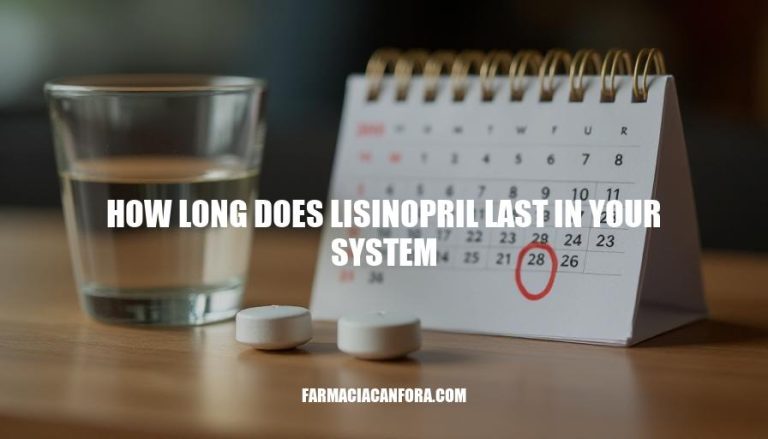


Lisinopril, an ACE (angiotensin-converting enzyme) inhibitor, is primarily prescribed to manage high blood pressure (hypertension) and heart failure, and to improve survival after a heart attack. It helps relax blood vessels, making it easier for the heart to pump blood. A crucial aspect of its relevance lies in patient safety and medication adherence, particularly regarding the question: how long does lisinopril last in your system? Understanding this can help ensure proper dosing and timing, thus optimizing its therapeutic effects while minimizing potential side effects.
Lisinopril is an angiotensin-converting enzyme (ACE) inhibitor used to treat hypertension, heart failure, and myocardial infarction. The pharmacokinetic properties of lisinopril include its absorption, metabolism, and elimination.
Absorption: Lisinopril is administered orally and has an approximate bioavailability of 25%, with a wide range between individuals (6% to 60%). The peak plasma concentration is reached within about 7 hours after oral administration.
Metabolism: Lisinopril is not metabolized by the liver.
Instead, it is excreted unchanged in the urine.
Elimination: The elimination half-life of lisinopril is about 12 hours. This means that it takes approximately 12 hours for the concentration of the drug in the body to be reduced by half. Consequently, how long does lisinopril last in your system depends on this half-life, with the drug being mostly eliminated within 24 to 48 hours after a single dose.
How long does lisinopril last in your system? Lisinopril has a half-life of approximately 12 hours, meaning it takes about 12 hours for half of the drug to be eliminated from your body. However, its effects can last up to 24 hours.
The medication reaches its peak effect around 6 hours after oral administration, but it may take up to 4 weeks to see the full benefits in blood pressure reduction.
How long does lisinopril last in your system? The duration lisinopril remains in your system can be influenced by several factors:
Dosage: Higher doses of lisinopril may take longer to be completely eliminated from the body compared to lower doses.
Age: Older adults may metabolize and excrete lisinopril more slowly than younger individuals, leading to a longer duration in the system.
Renal Function: Since lisinopril is primarily excreted by the kidneys, impaired renal function can significantly prolong its presence in the body.
Frequency of Use: Regular use of lisinopril can lead to accumulation in the body, affecting how long it stays in the system.
Metabolism: Individual metabolic rates can vary, influencing how quickly lisinopril is processed and eliminated.
Genetics: Genetic factors can affect how an individual’s body processes and eliminates lisinopril.
Body Weight: Body weight can influence the volume of distribution and the elimination rate of lisinopril.
These factors collectively determine how long lisinopril remains detectable in your system and can vary from person to person.
Lisinopril, an ACE inhibitor, is primarily prescribed to manage high blood pressure and heart failure. Its pharmacokinetic properties include absorption, metabolism, and elimination.
The drug has a half-life of approximately 12 hours, meaning it takes about 12 hours for half of the drug to be eliminated from your body. However, its effects can last up to 24 hours.
Factors such as dosage, age, renal function, frequency of use, metabolism, genetics, and body weight can influence how long lisinopril remains in your system.
It is essential to consult healthcare professionals for personalized information on how long lisinopril lasts in your system.